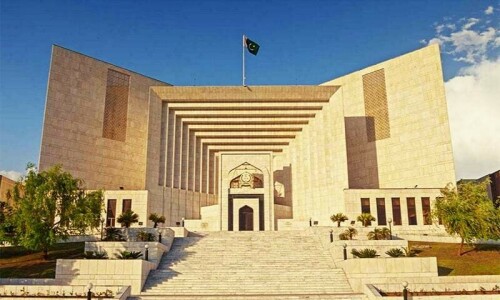• Unanimous decision by five-member bench orders proceedings against May 9 suspects to be shifted to criminal courts
• Four out of five judges declare multiple provisions of army act ‘unconstitutional, without legal effect’; govt to file appeal soon
ISLAMABAD: In a judgement that was hailed widely across the political spectrum, a five-member bench of the Supreme Court on Monday declared unconstitutional by a majority of 4-1 the military trials of civilians for their alleged role in attacks on army installations.
Led by Justice Ijazul Ahsan, the bench comprising Justice Munib Akhtar, Justice Yahya Afridi, Syed Mazahar Ali Akbar Naqvi, and Justice Ayesha A Malik unanimously emphasised that the cases of the accused involved in the May 9 riots will proceed before criminal courts.
“Without prejudice to the generality of the foregoing the trials of civilians and accused persons, being around 103 persons who were identified in the list provided to the apex court by the attorney general for Pakistan (AGP) and all other persons who are now or may at any time be similarly placed in relation to the events arising from and out of May 9 and 10, 2023, shall be tried by criminal courts of competent jurisdiction established under the ordinary and/or special law of the land in relation to such offences of which they may stand accused,” the order said.
The short order, the detailed reasons of which would follow soon, also declared that any action or proceedings under the Pakistan Army Act (PAA) 1952 in respect of these persons or any other persons to trial by the court martial are and would be of no legal effect.
Justice Yahya Afridi, however, reserved his ruling on a point which the majority of four judges held that Section 2(1)d(i) and 2(1)(d)(ii) and Section 59(4) of the PAA were ultra vires and therefore of no legal effect. Section 2(1)(d)(i) says that those persons not otherwise subject to PAA become subject to the law if they were accused of seducing or attempting to seduce any army officer from his duty or allegiance to the government.
Likewise, Section 2(1)(d)(ii) says individuals could be tried under PAA if they have committed an offence in relation to any work of defence, arsenal, naval, military or air force establishment or station, ship or aircraft or otherwise in relation to the naval, military or air force affairs of Pakistan an offence under the Official Secrets Act 1923. Section 59(4) says that any person who becomes subject to PAA will liable to be tried under this act.
AGP Mansoor Usman Awan told Dawn that the federal government will soon move an appeal against the decision. If the appeal is filed, the same, in accordance with the Supreme Court (Practice and Procedure) Act 2023, will be taken up by a larger bench consisting of judges not part of the present five-judge bench.
‘Without fear and favour’
Senior counsel Khwaja Ahmad Hosain, who represented former chief justice Jawwad S Khawaja and had challenged Section 2(1)(d)(i) and (ii) of the PAA to be inconsistent with the fundamental rights, described the judgement as “historic and bold”, as the court stood for the Constitution and the rule of law — without fear or favour.
“It should give hope to all those losing hope in difficult times,” the counsel said, adding as long as courts were independent, challenges could be faced and overcome. The nations with independent judges giving decisions in accordance with their oaths of office flourish and prosper, he emphasised and added, “Today is a good day for the Constitution and for our country.”
Former additional attorney general Tariq Khokhar described the judgement as a triumph for the wretched people of Pakistan, the Constitution, and the rule of law in the face of “raw power”.
“The decision also fulfils our obligations under the international law. It is the finest moment for the petitioners, their counsels and the judges who have risked so much,” he said.
Advocate Usama Khawar siad the Supreme Court’s “trailblazing verdict, challenging military trials for civilians, marks an unprecedented stride”.
“It confronts military preferences at their zenith, rather than biding its time for their influence to wane,” he said, adding that the decision “constitutes a transformative juncture in Pakistan’s legal narrative, with far-reaching implications for other laws impeding the right to a fair trial”.
In the face of Pakistan’s alleged current “hybrid” governance, the court’s audacious stance in upholding the right to a fair trial and declaring trials of civilians unconstitutional for times to come not only burnishes its own reputation but also underscores the new Chief Justice Qazi Faez Isa’s impartiality and independence.
Applications dismissed
The judgement, however, dismissed a set of nine applications moved to make the applicants facing military trials a necessary party. The applications were rejected since they were not supported by appropriate affidavits as per requirement of the Supreme Court Rules, 1980.
The applicants had requested for early conclusion of their cases by the military courts in separate applications. They had pleaded that they had complete faith and confidence in the military authorities to provide justice to them and to other accused persons.
During the hearing, Justice Ayesha A. Malik emphasised that Article 8(3) of the Constitution “places a heavy burden by specifically stating that no law could be made in derogation of the fundamental rights as guaranteed under the Constitution”. Such specific command of the Constitution cannot be left open-ended, Justice Malik emphasised.
Published in Dawn, October 24th, 2023













































